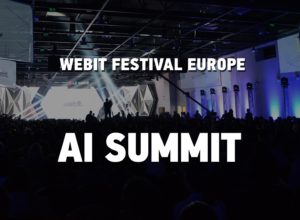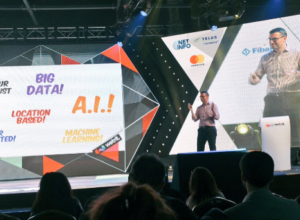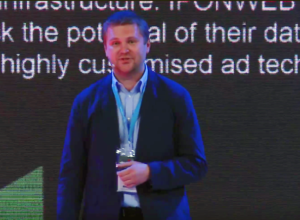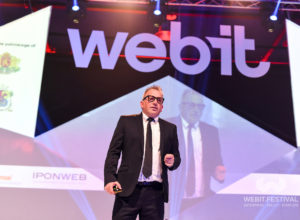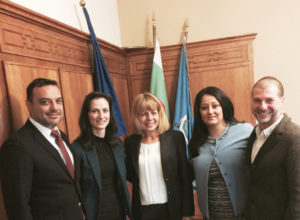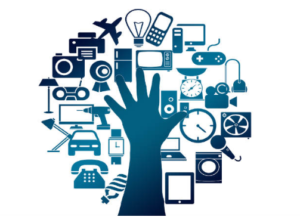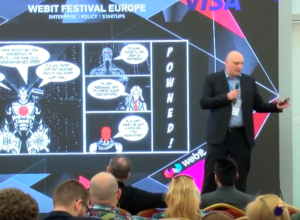Humanistic Trans-humanism
“Some technology solutions may not only erase physical or mental deficits but leave patients better off than ‘able-bodied’ folks. The person who has a dis-ability today may have a super-ability tomorrow.”
Stephen HawkingWhat are the “assistive technologies”?
check the upcoming 👉 Webit.Festival 2018
Simply put, this is a technology that is used to increase, maintain, or improve the functional capabilities of people with disabilities. To give you a quick glimpse into understanding, the name Stephen Hawking would help. Hawking has experimented with numerous technologies of this kind. He has communicated using a spelling card, indicating letters and forming words with a lift of his eyebrows. Then, with the help of a computer program allowing him to select words and commands using a hand clicker linked to a speech synthesizer, he has obtained a voice. By moving a single muscle on his cheek and selecting characters from a software screen keyboard, he is able to deliver his thoughts. Normally, one would say that such technology is good for people with disabilities. That way they can:- continue learning or
- be able to maintain a profession.
Technology has played an immense role in helping scientists invent different devices in order to help people with disabilities.
There are hearing devices already put in use, eye tracking and brain controlled interfaces that help to communicate with a computer. Developments towards making artificial retinal implant that can restore lost vision, cars for blind people, exoskeletons assisting people with movement difficulties, enhanced learning for people with learning disabilities that measures and stimulates the brain’s activity. And the big top: brain computer interfaces - a direct communication pathway between an enhanced or wired brain and an external device. The use and progress of Artificial Intelligence is a big stake in improving people’s lives but the thing is that these technologies are being constantly developed and people have benefited from this but these same people are not so many at all 60% of the people are afraid of the progress in AI and robotics. How much will they develop? Will the scenarios from almost all Hollywood movies on the theme shift to reality? We will just have to wait till 2045 and see if Ray Kurzweil’s prediction about the Singularity Point will turn up to be true and whether AI will be developed to such an extent that we’ll be able to merge with it. Watch the full keynote of Maurice Grinberg, Director of HiLab for getting a wider perspective on what AI is here: [embed]https://www.youtube.com/watch?v=ZYPrwZqE9vo[/embed]Intangible assets – blockchain relation
Do your friends ever talk about blockchain, fintech, transactions, etc.. and you just sit there not knowing what to say? Alexander Shulgin is here to bring some light and educate us on these terms.
Bitcoin, he explains, is not a currency, although we use it like that. It is in fact a decentralized distribution data based technology based on trust, used for transactions, agreements, etc.
 The infographic shows the starts of tomorrow and they are based on patent IP and full copyright.
A case study that Alexander presents can be seen here:
[embed]https://www.youtube.com/watch?v=ZScSjPjPEqg[/embed]
Keep up with Webit.Festival 2018 agenda with a series of startup events such as the Founders Games, Startups & Investors Summit, nurturing the connection between these two intertwined parties. And more.
The infographic shows the starts of tomorrow and they are based on patent IP and full copyright.
A case study that Alexander presents can be seen here:
[embed]https://www.youtube.com/watch?v=ZScSjPjPEqg[/embed]
Keep up with Webit.Festival 2018 agenda with a series of startup events such as the Founders Games, Startups & Investors Summit, nurturing the connection between these two intertwined parties. And more.
Do you believe that blockchain affects only banks and banking institutions? Well, you are wrong.
The first companies to use this technology were not banks, nor are the ones that use it today - companies like Apple, Alphabet, Microsoft, Exxon Mobile. It will disrupt firstly intellectual property, for example, as well as other intangible assets. Nowadays, a priority of all the businesses is to establish a global database for intangible assets. Without them, businesses cannot do any IoT, anything that is based on blockchain. It became clear that blockchain and Intangible assets go hand in hand, but they also create a platform for- knowledge economy and
- creative economy
 The infographic shows the starts of tomorrow and they are based on patent IP and full copyright.
A case study that Alexander presents can be seen here:
[embed]https://www.youtube.com/watch?v=ZScSjPjPEqg[/embed]
Keep up with Webit.Festival 2018 agenda with a series of startup events such as the Founders Games, Startups & Investors Summit, nurturing the connection between these two intertwined parties. And more.
The infographic shows the starts of tomorrow and they are based on patent IP and full copyright.
A case study that Alexander presents can be seen here:
[embed]https://www.youtube.com/watch?v=ZScSjPjPEqg[/embed]
Keep up with Webit.Festival 2018 agenda with a series of startup events such as the Founders Games, Startups & Investors Summit, nurturing the connection between these two intertwined parties. And more. It’s evolution, baby!
Starting by examining the opinion of Webit’s Blue Stage audience on their belief in evolution or if God made it all, Michael Schuster, partner at Speedinvest, managed to deliver a pretty helpful and interestingly funny presentation on the topic of the two main intertwined disruptors in business: startups and investors.
Tides turn and seasons change, yesterday’s predator becomes today’s prey. Why are some companies around for tens or a hundred of years already, be it Siemens, IBM, and whatever company acknowledged by everyone as a steady rock in business, while others don’t survive the light of the next day?
Schuster presented the ideal graph of a startup funding escalation:
А startup is launched with friends, family, getting private and angels’ investments, then going through series of rounds and going up and up until the one point IPO. It would’ve been nice if every startup story goes this way, but most of the times it doesn’t happen as ideal as this. Startups “start”, get whatever help possible, moving from getting seed investments to almost disappearing, going up and down until the moment of breaking through the market or collapsing and disappearing. For a startup, what is essential before the run for scaling, acquisitions and becoming unicorns, is that: you just need to survive. And in order to survive in the world and not become an extinct dinosaur, the law of evolution applies pretty much for startups too: it is not the strongest of the species that survive, nor the most intelligent, but the one most responsive to change. Both statistics and reality show well enough the differences between the european and US markets. The business models applied in the latter don’t always work that well in the european market which is not always taken in enough consideration. Funny enough, investment companies, as an industry that is actually funding disruption hasn’t been disrupted itself in a long while. A lot of things need to be considered by startups while trying to get the attention of investors and customers. Big, trendy words like AI, customer centric, big data and so on are constantly thrown at the funding companies; startups are chasing investors not quite suited for them and accelerators way before the time for this has come while missing some important points.If you are interested in learning what they are, check the full video of Schuster’s presentation at last year’s Webit here: [embed]https://www.youtube.com/watch?v=KZRUcoHxn-c[/embed] Keep up with Webit.Festival 2018 agenda with a series of startup events such as the Founders Games, Startups & Investors Summit, nurturing the connection between thesе two intertwined parties. And more.Innovation in digital data activation in programmatic
Bid enrichment is not in the future, it is happening now
The topic of bid enrichment has been a passion for the General manager Emerging technologies of Iponweb, Andrey Khemmelis for a long time. Before 1000 people Andrey presented Iponweb’s innovation in the area of data activation. Along with targeting the different features in a commercial production, historically, there has been a lot of waste. Which means your campaigns are seen by many people outside the target group, which may not be a terrible thing. But more and more marketers nowadays are trying to minimize this waste.There have been two major milestones in digital advertising:
- When advertisers got the ability to target their audience for the first time using sponsored campaigns
- When real time programmatic trading came around, which on one hand gave unlimited opportunities to marketers to target their ads better, but on the other hand it dramatically increased complexity of media operations
Ethics in data usage
You must have heard about data
Just open up any news website, newspaper and the figures are there. It’s the buzzword of our time - everybody is talking about data, flow of data, security, protection, etc. As is technology. You use technology everywhere - all around you. Уou use it every single day. Аnd that’s exactly where the real danger lies. The Estonian Prime Minister, Kersti Kaljulaid, is saying that society is changing because of the washing machine, not because it landed on the Moon, quoted by local media seems more inline with what’s happening today that any other jibber jabber. That’s to say, simple, everyday technology really changed the way people live, not high end software that very few people possess.Now that you are scrolling facebook..
..how do you know that one of your friends is not exactly your friend? Or perhaps somewhere out there is holding you personal data for God-knows-what? Well you can’t. Internet and the websites offer anonymity to a huge extend. At least to somebody who knows how to work with data. For the artificial intelligence there are no hidden spots. Jason Jercinovic, the Global Head of Marketing innovation of Havas, tackled the ethical issues of companies using data, personal data, for various purposes @Webit.Festival Europe 2017. Machines today know all about you - the emojis you use, the personal thoughts you share and anybody with access to that can easily use this information. Why is it OK for a car company to know its customers, their behavior and send newsletters with the innovations they would be interested in? But it’s not OK when terrorist groups research and target young men and women to enter the military? Companies are still struggling to define what sensitive data is and how to protect it. The lack of clear regulations doesn’t help in fighting the problem. The first steps towards some kind of decision have been taken. In January 2012, the European Commission proposed a comprehensive reform of data protection rules in the EU. The directive will effectively enter into force from May 2018.This and more will be discussed @Webit.Festival Europe 2018
Webit is the flagship event of a European digital week part of which will be the Digital Assembly, the annual high level gathering of European executives. Topics like Data encryption, privacy & security as well as data flow and its ethical implications are part of the Innovation Summit. They will be covered by experts and legislators. If you want to keep up with the latest trends in the world of digital economy and technology, then Webit.Festival is the right place for you. Visit our website and book 2 in 1 of our Super Earlybird tickets for Webit.Festival Europe 2018. You can watch Jason Jercinovic’s keynote here: [embed]https://www.youtube.com/watch?v=vlDC9VSxUCU[/embed]Major update – Grateful
(left to right - Minister Transport, IT and Communications I. Moskovski, European Commissioner Digital Agenda and Society, M. Gabriel, Mayor of Sofia,. J. Fandakova, Minister of the Presidency of the Counsil of the European Union Mrs. L. Pavlova and the Executive Chairman of Webit.Foundation P. Russev)
Dear friends,
I want to share with you how grateful I am that the result of the efforts of so many partners - policy makers, enterprise leaders, founders, scientists, investors and friends of Webit to continue the dialogue on re:Inventing Europe's Future in such a positive and impressive manner! I will keep this major update as brief as possible and in case of interest to get involved – would be happy to provide you more info. A few days ago the European Commissioner Digital Agenda and Society Ms. Mariya Gabriel has officially announced the “EU Digital and Innovation Week”. It will take place on 25-29 June 2018 in Sofia, hosting:- 1500 top EU policy makers – Heads of State, EU Commission , EU Parliament, Ministers
- 5000 business leaders ranging from Fortune 500 top executives to most promising European startup founders
Webit.Foundation is proud to be part of EU Digital and Innovations Week and of these common efforts on establishing a clear focus on Europe's digital future and the role of CEE as one of the engines empowering it!
It is a great time for Europe to take advantage of the still untapped potential of CEE for the sake of all Europeans and for the sake of our children, whom we have borrowed our present from!
We have a lot of work to do together and now is about time to do it - latest 25-29 June 2018!
I would be delighted to see you at the 10th anniversary of Webit.Festival Europe 2018 and to welcome you as one of the impact people who will join us from all around the world.
Here is how you may get involved:
- Call for speakers – apply and join the world first class speakers of Webit.Festival Europe 2018 - one of the most impactful individuals in Europe and the World - Startup? Apply and get selected among Europe's top 200 startups. Webit.Foundation shall provide you EVERYTHING for FREE - free expo table, a pitch opportunity on stage and opportunity to get 200 000 EUR cheque! For the past 10 year Webit is committed on supporting the innovation and startup ecosystems in Europe and worldwide and unlike others we DO NOT charge money the people who build the future, but support and provide grants to them! See more online. - Exhibit and/or become a Sponsor of this unique opportunity in 2018 to connect with all parties involved in shaping the future of Europe – large enterprises, governments, municipalities and the entrepreneurial world. Attend and be among the limited number of 7000 people to discuss how to re:Invent Europe's Future while exploring unparalleled business and social networking. Looking forward to meeting you soon – latest in Sofia - The Digital Capital for Webit.Festival Europe and the "EU Digital and Innovations Week"!Warmest regards,
Plamen
The IoT tide
“If we had computers that knew everything there was to know about things - using data they gathered without any help from us - we would be able to track and count everything, and greatly reduce waste, loss and cost. We would know when things needed replacing, repairing or recalling, and whether they were fresh or past their best.” Kevin Ashton, digital innovation expert, credited with coining the term “Internet of Things”.
Let’s look at an example
In 2007, a bridge in Minnesota collapsed because of steel plates that were inadequate to handle the bridge’s load, resulting in many people being hurt. It’s one of the most catastrophic in terms of injured people, but many similar incidents are happening everywhere in the world. Despite periodic checkups of the structures, engineers and other staff involved couldn’t predict the exact moment a problem like this would occur.That’s where IoT can come in handy
When bridges or other massive structures are build or rebuild, instead of a regular one, a smart cement could be used - a cement equipped with sensors to monitor stresses, cracks, and warpage that signals when a problem arises and gets fixed before it causes a catastrophe. If the road on a bridge or any motorway and street is slippery, the same sensors would detect the hazard and communicate the information to the driver’s car. Once the car detects the hazard ahead, it indicates the driver to slow down or the car itself would slow down for him. Sensors on the bridge will connect and communicate with machines in the car, information is then turned into action. And these technologies aren’t limited only to a bridge’s structure. If policy makers and businesses get it right, linking the physical and digital worlds could generate up to $11.1 trillion a year in economic value by 2025. Currently, most of the data gathered by IoT systems and devices is not used. Cloud-based applications are the key to using leveraged data. The Internet of Things doesn’t function without cloud-based applications to interpret and transmit the data coming from all these sensors. The cloud is what enables the apps to work best anywhere and anytime.The game-changer
MClimate (Melissa Climate) is an IoT company which changes the way people use the appliances they already have. Its cloud system connects the heating and cooling system in one’s home, so an actual insight and control is gained of over 70% of an electricity bill. Their devices learn your preferences and habits - what temperature you are most comfortable with, when you usually get home, how long it takes for your HVAC system to cool down/heat up etc. Melissa climate won a Webit Award in the category Best Connected Consumer Electronics Device at Webit.Festival 2017. You can watch Lyubomir Yanchev’s pitch right here: [embed]https://www.youtube.com/watch?v=5d0gXq7cYpk[/embed] Stay up to date with the upcoming festival’s agenda here. If you wish to learn more about the IoT, you can check this article in Forbes magazine.Risk assessment is dead! Be risk aware.
Let’s put a cyber security smile on the face of your top docs.
In his presentation @Webit.Festival Europe, Boris Goncharov, a leading cyber security strategist, explained a rather boring subject - cyber security threats. And he did it with a story and fictional characters that he created himself! Boris Goncharov’s character - Captain Ciso, is the great defender of the Business city - the city where all the capital is - human, money, business doing, whatever. While he used to save data, defend the city and its citizens from malware, the situation is changed now. One the one hand, the villains express your organisation’s vulnerability. Next the Business city is attacked by bots and the worst type of threat is the very invisible one that never leaves traces and you never it was ever there. The city entered the 21st century. So did the Captain - along with Artificial intelligence on his side, he started using the combination of CMA - DTA - CDSS. This is the logic of the cyber security management of the future. This is the newest way to defeat your cyber security operations and will allow you to continue to monitor, correlate the state of these controls with the external environment. In order to do all this, you need to be aware of the external environment - a common mistake that everybody does - not making a risk evaluation. Once done, this brings nothing but knowledge - action needs to be taken, because threats are all around us. That’s why it’s vital to understand the correlation between your environment and what you can do. The solutions don’t change as much as the treats do. Risk assessment is dead! Today we have to be risk aware every minute. You can watch the full keynote of the captain here: [embed]https://www.youtube.com/watch?v=bNs_YFhe19c[/embed] If you want to stay up to date with the latest trends in security and privacy, Webit.Festival Sofia 2018 is the place for that. Visit our website and check the different ticket options.The future tech of money
Money and payments - an intriguing theme ever since way back in time, becoming more and more intriguing with each passing day. What makes it even more appealing is the never ceasing research and emerging tech innovations in the field. Blockchain, Bitcoin, international trade, digital currencies are in the focus and interest of not only corporations as a main actor, but for individuals too.
That brings the questions Kristo Kaarmann CEO of TransferWise, was trying to answer at Webit.Festival Sofia 2017. What is the future tech of money? Is it going to be Bitcoin? Ethereum? Or another type of blockchain currency? Are we still going to have banks in 10 years time or we’ll do banking on Google? Who can make a 100% certain statement and predict what and when will replace a financial system which is working, trusted and being accepted by many all around the world?
Kaarmann made an emphasis on an article published by The Guardian “Big banks earning huge profits from overseas money transfers”. Banks get their profits from different exchange rates, transfer fees, and fees on other services which are far from the cheapest option to manage one’s money. In recent years there has been a flood of fintech companies offering their solutions to individuals, corporations and banks themselves and at much more reasonable rate.
There are very few problems where tech is the only possible solution. Very often the solution lies not just in technology, but in technology and the things around it - governments, legislation, working with different institutions. For example, in fintech, that could be as specific as blockchain patterns and the governments’ enforcements on them through the more global issues such as acceptance of the new models and novelties by people. In order to find the answers of all the questions the financial system has yet to clarify, we’ll just need to wait for it to present and see.
You can watch the full keynote of Kristo Kaarmann here:
https://youtu.be/CWhI7UgRJLw
If you want to stay up to date with the latest trends in fintech, money & payments, Webit.Festival Sofia 2018 is the place for that. Visit our website and check the different ticket options.
Feel the Webit vibe with some of the best photos from this year’s event!
[easingslider id="4954"]
